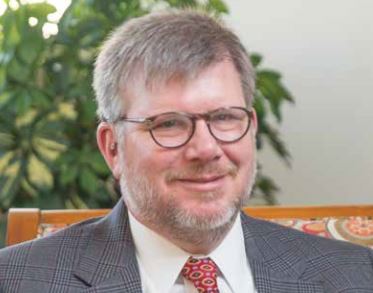Michael Walsh, M.D.
Solving the puzzle of mental illness.
 Mental illness is a medical condition that can disrupt a person’s thinking, feeling, mood, ability to relate to others and daily functioning. Just as high blood pressure can lead to a stroke, which could result in a long-term disability, mental illness is a medical condition that, if left untreated, may result in a diminished capacity for coping with the ordinary demands of life.
Mental illness is a medical condition that can disrupt a person’s thinking, feeling, mood, ability to relate to others and daily functioning. Just as high blood pressure can lead to a stroke, which could result in a long-term disability, mental illness is a medical condition that, if left untreated, may result in a diminished capacity for coping with the ordinary demands of life.
For 20 years, Dr. Michael Walsh, director of the LSU Behavioral Science Center, has treated patients with mental illness. “The nature of mental illness is complex,” he says. “It is often the result of chemical abnormalities or impairments to the neurotransmitters in the brain and, in addition, there are many social and emotional factors that come into play. Before we can find the missing piece of the puzzle to help our patients become whole again, we must consider all the biological, emotional and social aspects of our patients’ lives. Everyone is different and reacts differently when facing an obstacle, such as stress, physical pain or an emotional setback.”
A MULTIDISCIPLINARY TEAM TO TREAT ALL AGES
LSU-BSC provides a full range of outpatient treatment for adults and children with psychiatric illness. The clinical team at LSU-BSC includes psychiatrists, psychologists, social workers, residents and other trainees such as psychology fellows and interns. Residents are trained not only in outpatient medication management but also in multiple modes of psychotherapy and are provided with both psychopharamacology and psychotherapy supervisors. LSU-BSC specialists provide psychological assessment, diagnostic evaluation and effective treatment for a wide variety of psychiatric disorders including but not limited to:
· Attention Deficient Hyperactivity Disorder
· Anxiety
· Bipolar Disorder
· Depression
· Post-Traumatic Stress Disorder
· Schizophrenia
“We take pride in treating the person instead of the disease or condition,” Dr. Walsh says. “Mental health issues cannot be solved by algorithms. We consider our treatments to be a dynamic process between doctor and patient. Here, we teach our residents to listen and to engage their patients in the process and treatment of their mental illness. By taking ownership of their problems, our patients can help us to help them.”
Board certified in psychiatry, Dr. Walsh says he entered the field because he wanted the opportunity to help those with long-term mental illness. “We have such a diversity of patients here and we treat a variety of mental health conditions, from anxiety disorders to schizophrenia,” he says. “Many of my patients have anxiety disorder, bipolar disorder or suffer from some form of depression. What once began as internalized stress led to depression. Once they were no longer able to carry out major life activities such as going to work or school, the depression became more severe.”
Dr. Walsh says he and his colleagues like to consider all options in treating patients and believe the most effective treatments involve a combination of medicine and therapy. It’s an interdisciplinary approach to mental health; LSU-BSC offers skillful care guided by the most recent research findings and personalized combinations of medication and psychotherapy. Through its training programs in general psychiatry, child and adolescent psychiatry, and psychology, LSU-BSC seeks to actively prepare the next generation of leaders in clinical neuroscience and mental health care.
On the state of mental illness today: “I am optimistic because I have seen less of a stigma associated with mental illness,” Dr. Walsh says. “I find more people are willing to get treatment. They are actively looking for help and that is good thing.”
What about the future of psychiatry? “We are excited about telemedicine and how that may be utilized to increase access to good health care,” he says. “With the help of the LSU Healthcare Network, our clinic started a pilot study where selected clients can download an app on their phone, which allows them to communicate with the clinic and to schedule or have video appointments with their clinicians. This increases the accessibility of behavioral health services to those whose access is limited by geographic distances or physical health. It also provides a more convenient way for busy individuals to have routine follow up that is not disruptive to their schedule.”
Michael Walsh, M.D.
LSU Healthcare Network
LSU Behavioral Science Center
3450 Chestnut St.
New Orleans, LA 70112
(504) 412-1580
Medical School: Louisiana State University School of Medicine in New Orleans
Residency: Louisiana State University, Psychiatry
University of Washington, General Surgery
Board Certification: Psychiatry
